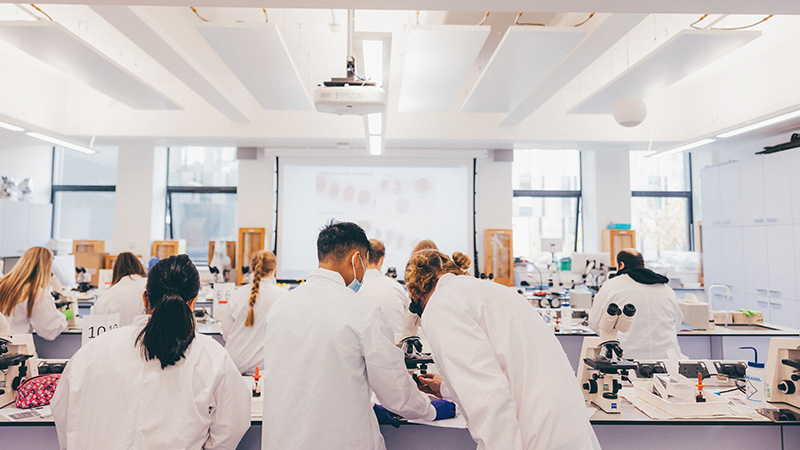UCAS code: C110
Start dates: September 2024 / September 2025
Full time: 4 years, 5 years sandwich
Part time: 8 years
Location: Headington
Department(s): Department of Biological and Medical Sciences
Overview
If you’re interested in biology and advanced research and want to push yourself academically, then our MBiol Biological Sciences is for you. We’ve designed the course to give you the best start for a career in industrial or academic research.
The first 3 years have the same structure as the BSc Biological Sciences course, with a final year devoted to a major research project either in the lab or in the field. You’ll work alongside our world-leading academics and explore topics from genetics to biodiversity. You’ll gain a postgraduate degree after 4 years, or 5 years if you do a placement year.
The employment market for bioscience graduates is buoyant. Your skills in lab techniques, data handling, critical analysis, creativity and report writing are highly valued by employers. You’ll emerge as a self-assured and independent-minded postgraduate. A problem solver with the skills and knowledge to benefit organisations.
Our supportive staff are internationally renowned researchers, and we enjoy strong links with industry. As you journey to success, we’ll support you each step of the way.

Why Oxford Brookes University?
-
Student support
We’re proud of our nurturing environment with good connections between staff and students. You’ll benefit from research-active tutors and small group sizes. This will support your academic and personal development.
-
Amazing facilities
A range of teaching labs with industry-standard equipment. Including bioinformatics, image analysis and a wide range of light and electron microscopes.
-
Course flexibility
Tailor the course to suit your interests. You can choose from a broad range of modules, starting with a foundation year if you need it, taking a year in industry or switching to our BSc at any time.
-
Strong industry links
Our partners come from a range of organisations, from large multinational organisations to small and medium sized enterprises; including university spin-out companies (OET, MetaGuideX).
-
International exchanges
Immerse yourself in a new place and culture. Step out of your comfort zone and experience what it’s like living and learning in a different country.
-
Free language courses
Free language courses are available to full-time undergraduate and postgraduate students on many of our courses, and can be taken as a credit on some courses.
-
Study abroad
You may be able to go on a European or international study exchange while you are at Brookes. Most exchanges take place in the second year. Although we will help as much as we can with your plans, ultimately you are responsible for organising and funding this study abroad.
Course details
Study modules
Teaching for this course takes place Face to Face and you can expect around 12 hours of contact time per week.In addition to this, you should also anticipate a workload of 1,200 hours per year. Teaching usually takes place Monday to Friday, between 9.00am and 6.00pm.
Contact hours involve activities such as lectures, seminars, practicals, assessments, and academic advising sessions. These hours differ by year of study and typically increase significantly during placements or other types of work-based learning.
Please note: As our courses are reviewed regularly as part of our quality assurance framework, the modules you can choose from may vary from those shown here. The structure of the course may also mean some modules are not available to you.
Careers
This degree offers a solid foundation for either postgraduate entry to a scientific career or preparation for doing a PhD. Our graduates are highly prized by employers as they bring an array of valuable skills into the workplace. Popular industries for bioscientists include:
- biopharmaceuticals
- bioscience, biotechnology, and healthcare
- environmental agencies
- environmental consultancies
- food and drink industries
- horticulture
- government or charity-funded laboratories
- universities and research institutes
- sequencing and validation scientist
- microbiologist
- science communication.
Graduate employers have included biotechnology firms including start-ups, various hospitals, and conservation organisations. Some continue onto PhDs, including internally funded PhDs.
Our Staff
Professor John Runions
John is a cell biologist who uses microscopy to study living cells. This type of research helps to answer questions about the ways in which cells and organisms grow and develop.
Read more about JohnEntry requirements
Wherever possible we make our conditional offers using the UCAS Tariff. The combination of A-level grades listed here would be just one way of achieving the UCAS Tariff points for this course.
Standard offer
UCAS Tariff Points: 104
A Level: BCC
IB Points: 29
BTEC: DMM
Contextual offer
UCAS Tariff Points: 88
A Level: CCD
IB Points: 27
BTEC: MMM
Specific entry requirements
A Level: Including one A Level or a comparable Level 3 qualification in a science subject (e.g. Biology, Chemistry, Maths, Physics, Psychology).
If you do not have a background in science, we encourage you to consider our Life Sciences Foundation year.
Please also see the University's general entry requirements.
English language requirements
Please see the University's standard English language requirements.
Pathways courses for international and EU students
If you do not meet the entry requirements for this degree, or if you would like more preparation before you start, you can take an international foundation course. Once you enrol, you will have a guaranteed pathway to this degree if you pass your foundation course with the required grades.
If you only need to meet the language requirements, you can take our pre-sessional English course. You will develop key language and study skills for academic success and you will not need to take an external language test to progress to your degree.
English requirements for visas
If you need a student visa to enter the UK you will need to meet the UK Visas and Immigration minimum language requirements as well as the University's requirements. Find out more about English language requirements.
Credit transfer
Many of our courses consider applications for entry part-way through the course for students who have credit from previous learning or relevant professional experience.
Find out more about transferring to Brookes. If you'd like to talk through your options, please contact our Admissions team.
Terms and Conditions of Enrolment
When you accept our offer, you agree to the Terms and Conditions of Enrolment. You should therefore read those conditions before accepting the offer.
International qualifications and equivalences
How to apply
Application process
Full time international applicants can also apply through UCAS
Tuition fees
Questions about fees?
Contact Student Finance on:
Tuition fees
Please note, tuition fees for Home students may increase in subsequent years both for new and continuing students in line with an inflationary amount determined by government. Oxford Brookes University intends to maintain its fees for new and returning Home students at the maximum permitted level.
Tuition fees for International students may increase in subsequent years both for new and continuing students.
The following factors will be taken into account by the University when it is setting the annual fees: inflationary measures such as the retail price indices, projected increases in University costs, changes in the level of funding received from Government sources, admissions statistics and access considerations including the availability of student support.
How and when to pay
Tuition fee instalments for the semester are due by the Monday of week 1 of each semester. Students are not liable for full fees for that semester if they leave before week 4. If the leaving date is after week 4, full fees for the semester are payable.
- For information on payment methods please see our Make a Payment page.
- For information about refunds please visit our Refund policy page
Financial support and scholarships
Additional costs
Please be aware that some courses will involve some additional costs that are not covered by your fees. Specific additional costs for this course are detailed below.
You will need to buy some basic personal protection equipment for laboratory practicals (lab coat, safety glasses), at a cost of around £25.
Information from Discover Uni
Full-time study
Part-time study
Programme changes:
On rare occasions we may need to make changes to our course programmes after they have been
published on the website. For more information, please visit our
changes to programmes page.

